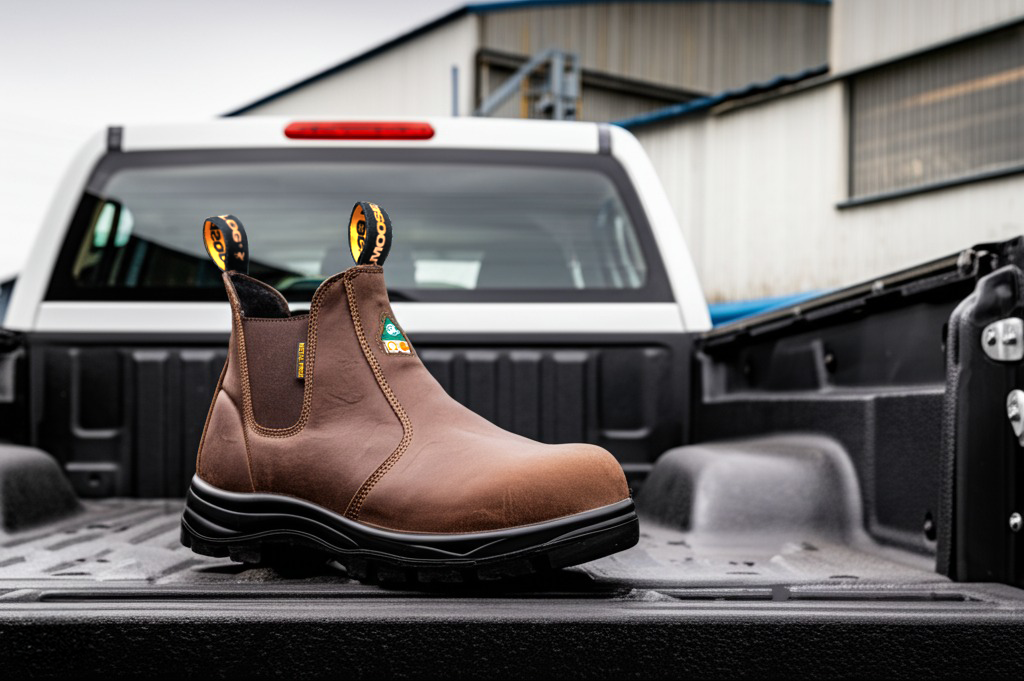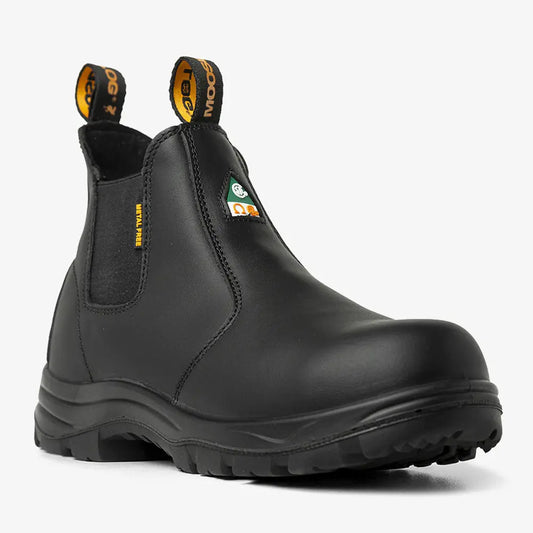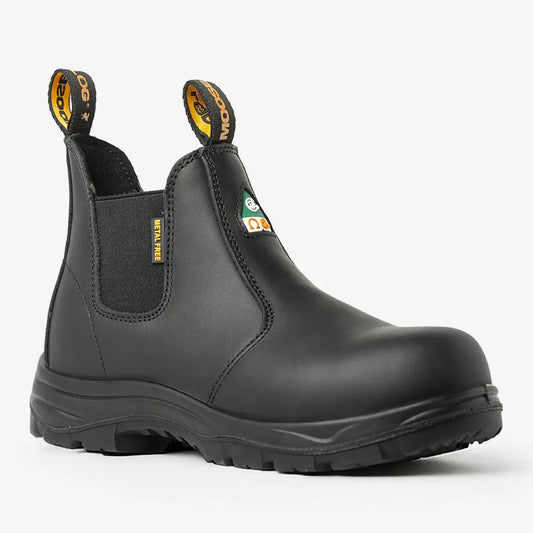Safety isn’t one-size-fits-all—especially when it comes to work boots. One of the most important safety classifications in the footwear industry is the Electrical Hazard (EH) rating. But not every worker needs EH rated boots. So, how do you know if they’re right for you?
In this article, we’ll break down which industries and job roles benefit most from EH rated, puncture-resistant work boots, and what factors to consider when making your decision. If you work around electricity or energized equipment, this is a must-read.
What Does "EH Rated" Mean Again?
EH rated work boots are tested and certified to provide a secondary level of protection against electrical shock. That means the outsoles and heels are constructed with non-conductive materials that can resist up to 18,000 volts under dry conditions.
But it's important to remember: EH boots do not replace primary PPE like gloves or rubber mats—they're an added layer of defense.
Both ASTM F2413 (U.S.) and CSA Z195 (Canada) set standards for EH footwear. CSA-certified EH boots also include puncture-resistant midsoles, which adds another level of protection.
Who Needs EH Rated Work Boots?
Let’s break it down by industry and job role.
1. Electricians
Do you need EH rated boots? Yes—absolutely.
Electricians work directly with energized panels, wiring, and equipment. EH rated boots are essential in reducing the risk of electrocution in case of accidental contact with live circuits.
What to look for:
- ASTM or CSA certification
- Composite toe caps (non-conductive)
- Puncture-resistant midsoles (especially for site work)
2. Construction Workers
Do you need EH rated boots? Often—especially in environments with temporary wiring or exposed power sources.
Construction sites are full of unknowns, including exposed wires, energized equipment, and stray nails. Even if you’re not working directly with electricity, EH boots protect against unexpected electrical hazards.
Recommended features:
- EH rating with CSA/ASTM certification
- Steel or composite toe protection
- Slip- and oil-resistant outsoles
- Puncture-resistant midsoles
3. Utility Workers (Power Line, Water, Gas)
Do you need EH rated boots? Yes.
Power line technicians and utility workers face constant exposure to live lines, electrical boxes, and transformer stations. EH rated boots offer peace of mind and compliance with safety regulations.
Bonus tip: EH boots are often required by utility companies as part of their PPE program.
4. HVAC Technicians
Do you need EH rated boots? Highly recommended.
HVAC professionals often service units with exposed circuits and may deal with both indoor and outdoor electrical systems. EH boots reduce the risk of shock when working in attics, basements, and rooftops.
Key features:
- Non-conductive soles
- Lightweight materials for agility
- CSA/ASTM certification
5. Manufacturing and Warehouse Workers
Do you need EH rated boots? Possibly—depending on your role.
If your role involves working near machinery with live wiring, EH boots provide critical protection. Many warehouses also include floor panels or equipment that can carry an unexpected charge.
Consider EH boots if:
- You work near automated systems or power tools
- Your job includes electrical equipment maintenance
- Your company’s safety guidelines require EH-rated PPE
6. Mechanics and Automotive Technicians
Do you need EH rated boots? Depends on the environment.
Electric vehicles, diagnostic tools, and shop equipment may expose you to live voltage. If you're dealing with high-voltage battery systems, EH boots are a smart choice.
Suggested features:
- CSA/ASTM certification
- Oil-resistant soles
- Comfortable fit for kneeling and standing
7. General Laborers
Do you need EH rated boots? It depends on the work site.
If you move between job sites or environments where electrical equipment is in use, it's safer to wear EH rated boots—even if electrical exposure isn’t your primary concern.
When You Might Not Need EH Rated Boots
Some roles don’t involve any exposure to live electrical sources or energized equipment. For example:
- Landscapers (unless working near buried cables)
- Painters or drywall installers in finished buildings
- Agricultural workers in low-risk environments
In these cases, toe protection and slip resistance might be more critical than EH features.
Still, many choose EH boots as a precaution, especially if they’re also puncture-resistant and comfortable enough for all-day wear.
How to Tell if a Boot is EH Rated
Check for these markers:
- Label inside the boot with “EH” and ASTM F2413-18
- CSA symbols: white rectangle with orange Ω (omega symbol)
- Product description on the website or box
All EH rated boots sold at MooseLog.com meet CSA and/or ASTM requirements and include puncture-resistant features for comprehensive protection.
Choosing the Right Pair
If EH rated boots make sense for your role, choose a pair that fits your work conditions:
✅ Electrical protection up to 18,000 volts (dry conditions)
✅ Puncture-resistant midsole
✅ Non-conductive outsole
✅ Composite or fiberglass toe cap
✅ Lightweight, comfortable build
Look for boots that are not just protective, but also easy to wear—because safety gear only works if you actually wear it.
Final Thoughts
EH rated work boots are a necessity in industries where electrical hazards are present—but even if you're unsure, having that extra layer of protection can make a real difference.
Whether you're an electrician, HVAC tech, warehouse worker, or utility crew member, choosing EH rated, puncture-resistant footwear that meets CSA or ASTM standards can help prevent accidents, reduce downtime, and keep you safe on the job.
Need a pair you can trust? Browse the selection at MooseLog.com—where comfort meets compliance for today’s toughest workers.





